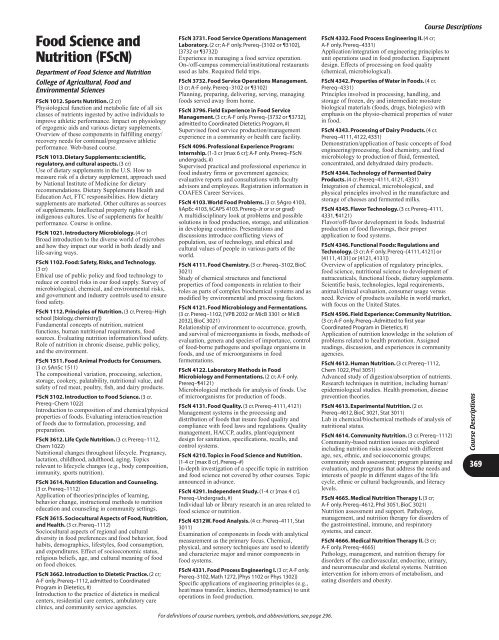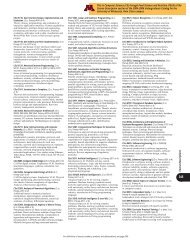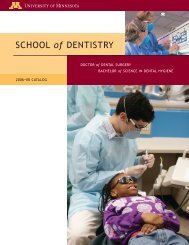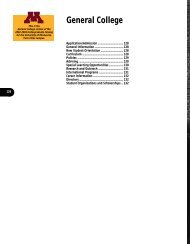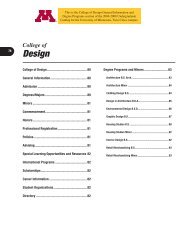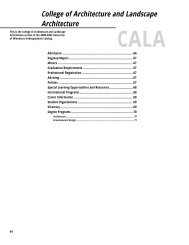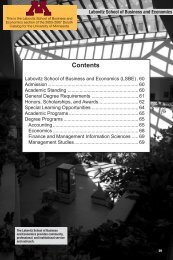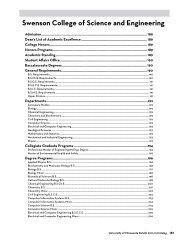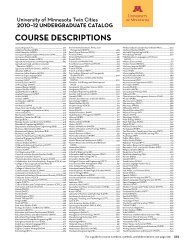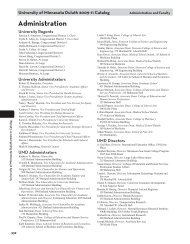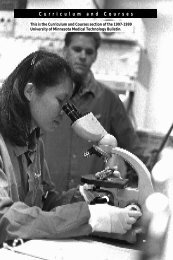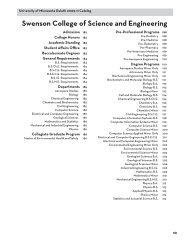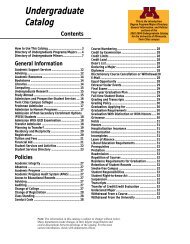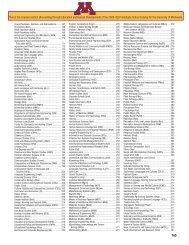Food Science <strong>and</strong>Nutrition (FScN)Department of Food Science <strong>and</strong> NutritionCollege of Agricultural, Food <strong>and</strong>Environmental SciencesFScN 1012. Sports Nutrition. (2 cr)Physiological function <strong>and</strong> metabolic fate of all sixclasses of nutrients ingested by active individuals toimprove athletic performance. Impact on physiologyof ergogenic aids <strong>and</strong> various dietary supplements.Overview of these components in fulfilling energy/recovery needs for continual/progressive athleticperformance. Web-based <strong>course</strong>.FScN 1013. Dietary Supplements: scientific,regulatory, <strong>and</strong> cultural aspects. (3 cr)Use of dietary supplements in the U.S. How tomeasure risk of a dietary supplement, approach usedby National Institute of Medicine for dietaryrecommendations. Dietary Supplements Health <strong>and</strong>Education Act, FTC responsibilities. How dietarysupplements are marketed. Other cultures as sourcesof supplements. Intellectual property rights ofindigenous cultures. Use of supplements for health/performance. Course is online.FScN 1021. Introductory Microbiology. (4 cr)Broad introduction to the diverse world of microbes<strong>and</strong> how they impact our world in both deadly <strong>and</strong>life-saving ways.FScN 1102. Food: Safety, Risks, <strong>and</strong> Technology.(3 cr)Ethical use of public policy <strong>and</strong> food technology toreduce or control risks in our food supply. Survey ofmicrobiological, chemical, <strong>and</strong> environmental risks,<strong>and</strong> government <strong>and</strong> industry controls used to ensurefood safety.FScN 1112. Principles of Nutrition. (3 cr. Prereq–Highschool [biology, chemistry])Fundamental concepts of nutrition, nutrientfunctions, human nutritional requirements, foodsources. Evaluating nutrition information/food safety.Role of nutrition in chronic disease, public policy,<strong>and</strong> the environment.FScN 1511. Food Animal Products for Consumers.(3 cr. §AnSc 1511)The compositional variation, processing, selection,storage, cookery, palatability, nutritional value, <strong>and</strong>safety of red meat, poultry, fish, <strong>and</strong> dairy products.FScN 3102. Introduction to Food Science. (3 cr.Prereq–Chem 1022)Introduction to composition of <strong>and</strong> chemical/physicalproperties of foods. Evaluating interaction/reactionof foods due to formulation, processing, <strong>and</strong>preparation.FScN 3612. Life Cycle Nutrition. (3 cr. Prereq–1112,Chem 1022)Nutritional changes <strong>through</strong>out lifecycle. Pregnancy,lactation, childhood, adulthood, aging. Topicsrelevant to lifecycle changes (e.g., body composition,immunity, sports nutrition).FScN 3614. Nutrition Education <strong>and</strong> Counseling.(3 cr. Prereq–1112)Application of theories/principles of learning,behavior change, instructional methods to nutritioneducation <strong>and</strong> counseling in community settings.FScN 3615. Sociocultural Aspects of Food, Nutrition,<strong>and</strong> Health. (3 cr. Prereq–1112)Sociocultural aspects of regional <strong>and</strong> culturaldiversity in food preferences <strong>and</strong> food behavior, foodhabits, demographics, lifestyles, food consumption,<strong>and</strong> expenditures. Effect of socioeconomic status,religious beliefs, age, <strong>and</strong> cultural meaning of foodon food choices.FScN 3662. Introduction to Dietetic Practice. (2 cr;A-F only. Prereq–1112, admitted to CoordinatedProgram in Dietetics, #)Introduction to the practice of dietetics in medicalcenters, residential care centers, ambulatory careclinics, <strong>and</strong> community service agencies.FScN 3731. Food Service Operations ManagementLaboratory. (2 cr; A-F only. Prereq–[3102 or 3102],[3732 or 3732])Experience in managing a food service operation.On-/off-campus commercial/institutional restaurantsused as labs. Required field trips.FScN 3732. Food Service Operations Management.(3 cr; A-F only. Prereq–3102 or 3102)Planning, preparing, delivering, serving, managingfoods served away from home.FScN 3796. Field Experience in Food ServiceManagement. (3 cr; A-F only. Prereq–[3732 or 3732],admitted to Coordinated Dietetics Program, #)Supervised food service production/managementexperience in a community or health care facility.FScN 4096. Professional Experience Program:Internship. (1-3 cr [max 6 cr]; A-F only. Prereq–FScNundergrads, #)Supervised practical <strong>and</strong> professional experience infood industry firms or government agencies;evaluative reports <strong>and</strong> consultations with facultyadvisors <strong>and</strong> employees. Registration information inCOAFES Career Services.FScN 4103. World Food Problems. (3 cr. §Agro 4103,§ApEc 4103, §CAPS 4103. Prereq–Jr or sr or grad)A multidisciplinary look at problems <strong>and</strong> possiblesolutions in food production, storage, <strong>and</strong> utilizationin developing countries. Presentations <strong>and</strong>discussions introduce conflicting views ofpopulation, use of technology, <strong>and</strong> ethical <strong>and</strong>cultural values of people in various parts of theworld.FScN 4111. Food Chemistry. (3 cr. Prereq–3102, BioC3021)Study of chemical structures <strong>and</strong> functionalproperties of food components in relation to theirroles as parts of complex biochemical systems <strong>and</strong> asmodified by environmental <strong>and</strong> processing factors.FScN 4121. Food Microbiology <strong>and</strong> Fermentations.(3 cr. Prereq–1102, [VPB 2032 or MicB 3301 or MicB2032], BioC 3021)Relationship of environment to occurrence, growth,<strong>and</strong> survival of microorganisms in foods, methods ofevaluation, genera <strong>and</strong> species of importance, controlof food-borne pathogens <strong>and</strong> spoilage organisms infoods, <strong>and</strong> use of microorganisms in foodfermentations.FScN 4122. Laboratory Methods in FoodMicrobiology <strong>and</strong> Fermentations. (2 cr; A-F only.Prereq–4121)Microbiological methods for analysis of foods. Useof microorganisms for production of foods.FScN 4131. Food Quality. (3 cr. Prereq–4111, 4121)Management systems in the processing <strong>and</strong>distribution of foods that insure food quality <strong>and</strong>compliance with food laws <strong>and</strong> regulations. Qualitymanagement, HACCP, audits, plant/equipmentdesign for sanitation, specifications, recalls, <strong>and</strong>control systems.FScN 4210. Topics in Food Science <strong>and</strong> Nutrition.(1-4 cr [max 8 cr]. Prereq–#)In-depth investigation of a specific topic in nutrition<strong>and</strong> food science not covered by other <strong>course</strong>s. Topicannounced in advance.FScN 4291. Independent Study. (1-4 cr [max 4 cr].Prereq–Undergrads, #)Individual lab or library research in an area related tofood science or nutrition.FScN 4312W. Food Analysis. (4 cr. Prereq–4111, Stat3011)Examination of components in foods with analyticalmeasurement as the primary focus. Chemical,physical, <strong>and</strong> sensory techniques are used to identify<strong>and</strong> characterize major <strong>and</strong> minor components infood systems.FScN 4331. Food Process Engineering I. (3 cr; A-F only.Prereq–3102, Math 1272, [Phys 1102 or Phys 1302])Specific applications of engineering principles (e.g.,heat/mass transfer, kinetics, thermodynamics) to unitoperations in food production.For definitions of <strong>course</strong> <strong>numbers</strong>, <strong>symbols</strong>, <strong>and</strong> abbreviations, see page 296.Course DescriptionsFScN 4332. Food Process Engineering II. (4 cr;A-F only. Prereq–4331)Application/integration of engineering principles tounit operations used in food production. Equipmentdesign. Effects of processing on food quality(chemical, microbiological).FScN 4342. Properties of Water in Foods. (4 cr.Prereq–4331)Principles involved in processing, h<strong>and</strong>ling, <strong>and</strong>storage of frozen, dry <strong>and</strong> intermediate moisturebiological materials (foods, drugs, biologics) withemphasis on the physio-chemical properties of waterin food.FScN 4343. Processing of Dairy Products. (4 cr.Prereq–4111, 4122, 4331)Demonstration/application of basic concepts of foodengineering/processing, food chemistry, <strong>and</strong> foodmicrobiology to production of fluid, fermented,concentrated, <strong>and</strong> dehydrated dairy products.FScN 4344. Technology of Fermented DairyProducts. (4 cr. Prereq–4111, 4121, 4331)Integration of chemical, microbiological, <strong>and</strong>physical principles involved in the manufacture <strong>and</strong>storage of cheeses <strong>and</strong> fermented milks.FScN 4345. Flavor Technology. (3 cr. Prereq–4111,4331, 4121)Flavor/off-flavor development in foods. Industrialproduction of food flavorings, their properapplication to food systems.FScN 4346. Functional Foods: Regulations <strong>and</strong>Technology. (3 cr; A-F only. Prereq–[4111, 4121] or[4111, 4131] or [4121, 4131])Overview of application of regulatory principles,food science, nutritional science to development ofnutraceuticals, functional foods, dietary supplements.Scientific basis, technologies, legal requirements,animal/clinical evaluation, consumer usage versusneed. Review of products available in world market,with focus on the United States.FScN 4596. Field Experience: Community Nutrition.(3 cr; A-F only. Prereq–Admitted to first yearCoordinated Program in Dietetics, #)Application of nutrition knowledge in the solution ofproblems related to health promotion. Assignedreadings, discussion, <strong>and</strong> experiences in communityagencies.FScN 4612. Human Nutrition. (3 cr. Prereq–1112,Chem 1022, Phsl 3051)Advanced study of digestion/absorption of nutrients.Research techniques in nutrition, including human/epidemiological studies. Health promotion, diseaseprevention theories.FScN 4613. Experimental Nutrition. (2 cr.Prereq–4612, BioC 3021, Stat 3011)Lab in chemical/biochemical methods of analysis ofnutritional status.FScN 4614. Community Nutrition. (3 cr. Prereq–1112)Community-based nutrition issues are exploredincluding nutrition risks associated with differentage, sex, ethnic, <strong>and</strong> socioeconomic groups;community needs assessment; program planning <strong>and</strong>evaluation, <strong>and</strong> programs that address the needs <strong>and</strong>interests of people in different stages of the lifecycle, ethnic or cultural backgrounds, <strong>and</strong> literacylevels.FScN 4665. Medical Nutrition Therapy I. (3 cr;A-F only. Prereq–4612, Phsl 3051, BioC 3021)Nutrition assessment <strong>and</strong> support. Pathology,management, <strong>and</strong> nutrition therapy for disorders ofthe gastrointestinal, immune, <strong>and</strong> respiratorysystems, <strong>and</strong> cancer.FScN 4666. Medical Nutrition Therapy II. (3 cr;A-F only. Prereq–4665)Pathology, management, <strong>and</strong> nutrition therapy fordisorders of the cardiovascular, endocrine, urinary,<strong>and</strong> neuromuscular <strong>and</strong> skeletal systems. Nutritionintervention for inborn errors of metabolism, <strong>and</strong>eating disorders <strong>and</strong> obesity.Course Descriptions369
370FScN 4696. Field Experience: Medical NutritionTherapy I. (6 cr; A-F only. Prereq–Second year studentsin Coordinated Program in Dietetics or #)Application of nutrition knowledge in the solution ofproblems related to disease <strong>and</strong> injury; assignedreadings, discussions, <strong>and</strong> experience in medicalcenters <strong>and</strong> long-term care facilities. Emphasis onnutrition support; gastrointestinal, immune <strong>and</strong>respiratory disorders, <strong>and</strong> cancer.FScN 4732. Food <strong>and</strong> Nutrition Management. (3 cr;A-F only. Prereq–3732, Mgmt 3001)Financial <strong>and</strong> human resource management appliedto a variety of business <strong>and</strong> institutional settings.Field trips may be required.FScN 4796. Field Experience in Food <strong>and</strong> NutritionManagement. (3 cr; A-F only. Prereq–Second yearstudents in Coordinated Program in Dietetics or #)Application of principles of food servicemanagement to problems in community, commercial,or health care facilities.FScN 4896. Field Experience: Medical NutritionTherapy II. (3 cr; A-F only. Prereq–[4696, admitted toCoordinated Program in Dietetics] or #)Application of nutrition knowledge to problemsrelated to health/disease. Readings, discussions,experience in medical centers. Emphasizescardiovascular, endocrine, urinary tract, energyimbalance; eating disorders.FScN 4996. Field Experience: Medical NutritionTherapy III. (2 cr; A-F only. Prereq–[4896, Admitted toCoordinated Program in Dietetics] or #)Application of nutrition knowledge to problemsrelated to health/disease, clinical managementexperience in medical centers. Emphasizespediatrics, home health care, staff relief.FScN 5411. Food Biotechnology. (2 cr. Prereq–4121)Genetic tools as applied to food biotechnology.Improvement of microbes used in food production bymodern biotechnological approaches. Discuss needfor stringent regulation of modern biotechnology aswell as ethical <strong>and</strong> legal issues.FScN 5421. Introduction to Food Law. (3 cr.Prereq–1102)Analysis of the federal legal requirements affectingthe production processing, packaging, marketing,<strong>and</strong> distribution of food <strong>and</strong> food products using caselaw studies <strong>and</strong> regulatory history.FScN 5431. Physiochemistry of Food. (2 cr.Prereq–4111)Surface phenomena, colloidal interactions, liquiddispersions, gels, emulsions <strong>and</strong> foams, <strong>and</strong>functionality of food macromolecules in thesesystems.FScN 5441. Introduction to New ProductDevelopment. (2 cr. Prereq–4111, 4331)Interactive <strong>course</strong> that introduces students to theprinciples of new product development, fromidentification <strong>and</strong> testing of new product concepts,<strong>through</strong> prototype testing, to basic process designusing examples from industry.FScN 5451. Structure <strong>and</strong> Function in Foods:Quantitative Analysis. (2 cr. Prereq–4312)Introduction to various procedures for analysis ofstructure <strong>and</strong> organization in raw <strong>and</strong> processed food.FScN 5461. Food Packaging. (2 cr. Prereq–1102, 3102,Phys 1102 or Phys 1302)Materials, principles, <strong>and</strong> procedures of packaging asthey apply to food products. Emphasis is onconsumer products, but the principles also apply tobulk <strong>and</strong> institutional foods <strong>and</strong> ingredients.FScN 5471. Advanced Food Chemistry. (3 cr.Prereq–4111)Chemical reactions taking place in formation,stability, <strong>and</strong> degradation of important foodconstituents. Examples of reactions for majorchemical changes occurring in food systems.FScN 5481. Sensory Evaluation of Food Quality.(2 cr; A-F only. Prereq–3102, Stat 3011)Fundamentals of sensory perception. Test designs<strong>and</strong> methods used in studying sensory qualities offoods. Current issues in sensory evaluation. Groupresearch project.FScN 5511. Meat, Poultry, <strong>and</strong> Seafood ProteinProcessing. (2 cr. Prereq–1102, Chem 2302)Industrial processing of meat, poultry, <strong>and</strong> seafoodproducts with emphasis on protein systems:comminuted products, nutraceutical products,thermal processing optimization, pasteurization, leastcost analysis, <strong>and</strong> color stability.FScN 5531. Grains: Introduction to Cereal Chemistry<strong>and</strong> Technology. (2 cr. Prereq–Biol 1009, Chem 1022)Origins, structure, biochemistry, <strong>and</strong> cellularproperties of major cereal grains as they relate toprimary processing (milling) <strong>and</strong> secondaryprocessing (production of cereal products).FScN 5621W. Nutrition <strong>and</strong> Metabolism. (4 cr.Prereq–4612, BioC 3021, Phsl 3051)Carbohydrate, lipid, <strong>and</strong> protein metabolism. Uses“systems” or “holistic” approach to emphasize howmetabolic pathways interrelate.FScN 5622. Vitamin <strong>and</strong> Mineral Biochemistry. (3 cr.Prereq–4612, BioC 3021, Phsl 3051)Nutritional, biochemical, <strong>and</strong> physiological aspectsof vitamins/essential minerals in human/experimental-animal models.FScN 5623. Regulation of Energy Balance. (2 cr.Prereq–5621 or 5621)Regulation of energy balance in humans, includingregulation of food intake <strong>and</strong> of energy expenditure.FScN 5631. Dietary Supplements: Regulatory,Scientific, <strong>and</strong> Cultural Perspectives. (3 cr)Concepts/principles of dietary supplements-RDA,dose-response, risk assessment. Laws/regulations,their interpretation concerning dietary supplements.Vitamins/minerals. Philosophy/use of botanicals/nutraceuticals in Western medicine in contrast toother cultures. Use of herbal supplements in Westernmedicine.Forest Resources (FR)Department of Forest ResourcesCollege of Natural ResourcesFR 1001. Orientation <strong>and</strong> Information Systems. (1 cr;A-F only)Forest resources, recreation resource management,urban forestry programs. Forestry <strong>and</strong> naturalresource careers. Qualification requirements forgovernment positions, competencies, internships, <strong>and</strong>experiences to compete for jobs in industry. Courseplanning, mentoring, alumni contacts. Leadership,organization, process. Lab equipment/software,GUIs, the Internet, spreadsheets, Lumina, periodicalindexes.FR 1101. Dendrology: Identifying Forest Trees <strong>and</strong>Shrubs. (3 cr)Identification nomenclature, classification, <strong>and</strong>distribution of common/important forest trees/shrubs.Use of <strong>key</strong>s. Field/lab methods of identification.FR 2101. Identifying Forest Plants. (1 cr; A-F only.Prereq–[Biol 1001 or Biol 1009], Biol 2022)Field identification of common north woods trees,shrubs, <strong>and</strong> nonwoody vascular plants. Emphasizesconcept of plant communities, soil site relationships,<strong>and</strong> wildlife values. Taught at Cloquet ForestryCenter.FR 2102. Northern Forests Field Ecology. (2 cr;A-F only. Prereq–[Biol 1001 or Biol 1009], [Chem 1011 orChem 1021])Field examination of natural history of northern/boreal forests with respect to soils, ecologicalcharacteristics of trees, community-environmentrelationships, st<strong>and</strong> development, succession, <strong>and</strong>regeneration ecology. Taught at Cloquet ForestryCenter.FR 2104. Measuring Forest Resources. (1 cr; A-F only)Introduction to l<strong>and</strong> survey, tree/forest st<strong>and</strong>measurement (mensuration), <strong>and</strong> forest samplingtechniques. Taught at Cloquet Forestry Center.FR 3104. Forest Ecology. (4 cr; A-F only. Prereq–Twobiol <strong>course</strong>s, chem <strong>course</strong>, knowledge of [basic botany,plant biology])Form/function of forests as ecological systems.Characteristics/dynamics of species, populations,communities, l<strong>and</strong>scapes, <strong>and</strong> ecosystem processes.Examples applying ecology to forest management.Weekly discussions focus on research topics in forestecology, exercises applying <strong>course</strong> concepts, <strong>and</strong>current issues in forest resource management.Required weekend field trip.FR 3114. Hydrology <strong>and</strong> Watershed Management.(3 cr. Prereq–[Biol 1009, Chem 1001, Phys 1001] or #)Introduction to hydrologic cycle <strong>and</strong> water processesin upl<strong>and</strong>/riparian systems. Applications ofhydrological concepts to evaluate impacts of forestmanagement <strong>and</strong> other l<strong>and</strong> use patterns/activities onwater yield, stormflow, erosion, sedimentation, <strong>and</strong>water quality. Concepts, principles, <strong>and</strong> applicationsof riparian/watershed management. Economic/socialfactors. Uses national/global examples. Emphasizesforest ecosystems.FR 3131. Geographical Information Systems (GIS)for Natural Resources. (4 cr; A-F only. Prereq–Jr)Introduction to GIS. Focuses natural resources. Datastructures, sources, collection, <strong>and</strong> quality. Labexercises introduce geodesy, map projections, spatialanalyses, <strong>and</strong> cartographic modeling.FR 3203. Forest Fire <strong>and</strong> Disturbance Ecology. (3 cr;A-F only. Prereq–3104 or equiv)Ecology, history, management, <strong>and</strong> control of fire,wind, insect infestation, browsing, <strong>and</strong> otherdisturbances in forests. Disturbance regimes ofboreal, northern hardwood, <strong>and</strong> other major foresttypes of North America. Influence of disturbance onwildlife habitat, urban/wildl<strong>and</strong> interfaces, forestmanagement, <strong>and</strong> st<strong>and</strong>/l<strong>and</strong>scape dynamics. Guestspeakers on fire organization, training, <strong>and</strong>operations. Two-day field trip.FR 3218. Measuring <strong>and</strong> Modeling Forests. (3 cr;A-F only. Prereq–[Math 1142 or [Math 1271, Math1272]], Stat 3011)General sampling design <strong>and</strong> survey techniques toassess current resource conditions. Application ofmetrics/sampling methods to forest vegetation.Calculation of tree/st<strong>and</strong> volume. Selection ofmodeling approaches. Case studies of modeling toproject future growth. L<strong>and</strong>scape processes,characterization, modeling.FR 3251. Natural Resources in SustainableInternational Development. (3 cr; A-F only)International perspectives on resource use indeveloping countries. Integration of natural resourceissues with social, economic, <strong>and</strong> policyconsiderations. Overviews of agriculture, forestry,agroforestry, non-timber forest products, waterresources, certification, <strong>and</strong> development issues.Latin American case studies.FR 3262. Remote Sensing of Natural Resources <strong>and</strong>Environment. (4 cr)Principles/techniques of remote sensing <strong>and</strong> itsapplications to mapping/monitoring l<strong>and</strong>/waterresources from local to global scales. Forest <strong>and</strong>natural resource inventory. Forest cover <strong>and</strong> soilmapping. L<strong>and</strong> use/global change analysis. Labprovides h<strong>and</strong>s-on experience working with aerialphotography <strong>and</strong> digital sensing imagery.FR 3411. Silviculture: Managing Forest Ecosystems.(4 cr. Prereq–3104 or #)Introduction to management of forest st<strong>and</strong>s,habitats, <strong>and</strong> ecosystems in a l<strong>and</strong>scape context.Philosophical approaches, silvicultural systems,methods/tools for reforestation, restorationtechniques. Intermediate st<strong>and</strong> treatments.Ramifications of management choices on quality,production, wildlife habitat, disturbance potential,aesthetics, old-growth development, <strong>and</strong> foresthealth. Lab. Weekend field trip required.FR 3431. Timber Harvesting <strong>and</strong> Road Planning.(2 cr. Prereq–3411 or #)Introduction to forest operations. Terminology, basicengineering, equipment <strong>and</strong> harvesting systemoptions, productivity/costs. Relationship to forest


